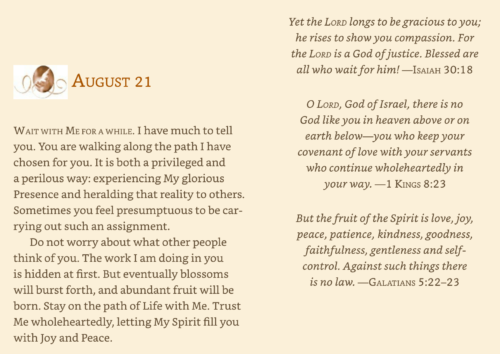We Are Being Guided
What will happen if I really trust God’s love for me and allow God to direct my life? —Ilia Delio, Franciscan Prayer
This week’s meditations focus on how we discern what actions are ours to do. As Francis of Assisi said on his deathbed, “I have done what is mine; may Christ teach you what is yours!” [1] Father Richard teaches that discernment begins with an authentic trust in God’s presence and guidance:
The full life of faith becomes a life of deep joy and rest. Once we are “grafted to the Vine,” to use Jesus’ words (see John 15:4–5), we don’t have to be anxious about many things (see Luke 10:41). We don’t have to be worried about the next moment or about tomorrow (see Matthew 6:34). We can trust that we are being guided; in fact, almost everything is seen as guidance. Our ability to trust that there is guidance available allows it to become guidance! Basically, we switch from the fixing, fully understanding, and controlling mode to the trusting, listening, and allowing mode. Then we start allowing the Divine Flow instead of stopping it with a “no” or a question mark.
The Spirit in us knows how to use everything that happens to bring about healing and growth. We can trust that “God is even in this!” That does not mean we shouldn’t work to change and improve things; in fact, quite the contrary. But when our first heart and soul response is a “yes” and not a “no,” then we can experience God in the moment and see guidance in the events of our lives. We can trust that nothing is wasted. If there are changes and fixes that have to be made, we can now take care of them in an appropriate, calm, and positive way. That is what characterizes a mature believer in any religion.
Faith, as we see in the Hebrew Scriptures and Jesus’ usage of them, is much closer to our words “trust” or “confidence” than it is about believing doctrines to be true. Simply believing doctrines demands almost no ego-surrender or real change of the small self. Holding confidence that God is good, God can be trusted, and God is actively involved in my life is a much more powerful and effective practice. This is the practical power of biblical faith. Faith-filled people are, quite simply, usable for larger purposes because they live in and listen to a much Larger Self.
Richard shares that contemplative practice helps us grow in such trusting faith:
From my own experience, I know I need a contemplative practice. Some form of the prayer of quiet is necessary to touch me at the unconscious level, the level where deep and lasting transformation occurs. From my place of prayer, I am able to understand more clearly what is mine to do and have the courage to do it.
Contemplation and Right Action
Father Richard shares about an important time of discernment in his life:
There are two spiritual disciplines that keep me honest and growing: contemplative prayer and the perspective from the bottom. In 1985, I was freed for a year to pursue the contemplative part of my vocation. It was a major turning point. Father William McNamara’s definition of contemplation—“a long loving look at the real”—became transformative. [1] The world, my own issues and hurts, all goals and desires gradually dissolved into proper perspective. God became obvious and everywhere.
Ultimately, we do not earn or find God. We just get ourselves out of the way. We let go of illusions and the preoccupations of our smaller selves. As the cheap scaffolding falls away, the soul stands revealed. The soul, or True Self, cannot be created or achieved by our work. It just is, and it is already. The soul is God’s “I AM” continued in me. That part of me already knows, desires, and truly seeks God. Discernment of God’s will comes naturally to the True Self because here “I” and God seem to be one “I.”
Richard reflects on how this extended time of contemplation brought him to a point of decisive action:
After my sabbatical year, I found my way to the conviction that I should open the Center for Action and Contemplation in New Mexico. I wanted to help people get thoroughly involved in the issues and goals of social justice, to help people work in solidarity with those on the margins, but from the right point of departure. It is possible to do the right thing for the wrong reasons!
Contemplation is a way to hear with the Spirit and not just with the head. Contemplation is the search for a wide-open space, a space broad enough for the head, the heart, the feelings, the gut, the subconscious, our memories, our intuitions, our whole body. We need a holistic place for discerning wisdom.
The effect of contemplation is authentic action; if contemplation doesn’t lead to genuine action, then it remains only navel-gazing and self-preoccupation.
I’m convinced that if we stick with it, if we practice contemplation regularly, then we will come to an inner place of compassion—for ourselves and for others. In this place, we notice how much the suffering of the world is our suffering. We become committed to this world, not cerebrally, but from the much deeper perspective of our soul. At this point, we’re indestructible, because in that place we find the peace that the world cannot give. We don’t need to win anymore; we just need to do what we have to do, as naive and simplistic as that might sound. That’s why Augustine could make such an outrageous statement as “Love [God] and do what you will”! [2] People who are living from a truly God-centered place instead of a self-centered place are dangerously free precisely because they are tethered at the center.
